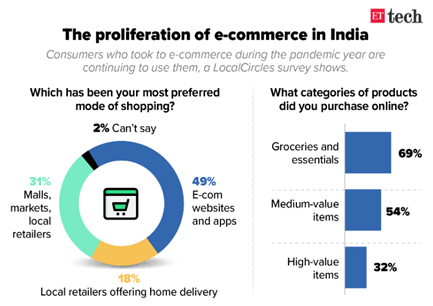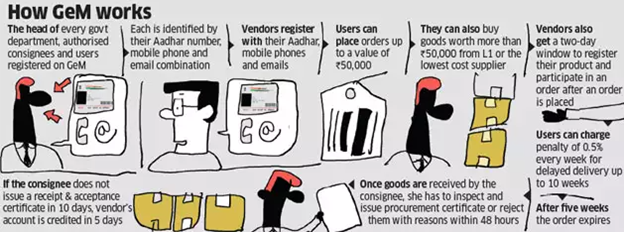Corner Stores Embrace Digital Commerce
Relevance
- GS Paper 3 Indian Economy and issues relating to Planning, Mobilization of Resources, Growth, Development and Employment.
- Tags: #Ecommerce #B2B #eB2Bplatforms #MintEditorial #UPSCMains2024 #CurrentAffairs2023 #UPSCPrelims2024.
Why in the News?
In India, traditional retail, including small kirana stores, continues to dominate despite the growth of modern trade and e-commerce. However, the potential of retail eB2B, which connects manufacturers directly to retailers, remains largely untapped.
Traditional Retail in India
- In every Indian neighborhood, you’ll find a kirana store – a small family-run shop that serves a limited area and usually makes around ₹1.5 lakh a month.
- Nearby, you’ll discover clusters of other stores, like clothing shops selling local brands (₹5 lakh/month) or mid-sized shops offering metal and plastic items (₹3 lakh/month).
- These neighborhood stores are crucial for daily essentials and support local businesses.
- Millions of traditional retail outlets operate in India, managing the last-mile distribution.
- Products move through a fragmented value chain, starting from manufacturers to regional distributors, retailers, and finally to consumers.
- Each link in this chain adds a margin, making up around 40% of the product’s total cost.
Traditional Retail’s Dominance and Challenges
Traditional Retail’s Significance
- In 2022, traditional retail formats comprised 87% of the $1 trillion in consumer spending in India.
- Despite the growth of modern trade and e-commerce, traditional retail will still account for 80% of the projected $1.5 trillion consumer spending in 2030.
- Especially in categories like groceries, clothing, home goods, pharmaceuticals, and dining.
Digital Potential and Challenges
- The fragmented traditional retail chain holds vast potential for digital efficiency through aggregation. However, this has been slow due to unfavorable economics.
- Indian consumers, on average, spend about ₹4,000 per month in urban areas and half that in rural regions, resulting in small order values.
- Additionally, 97% of the country’s land is rural, lacking adequate last-mile distribution, making logistics expensive.
Retail eB2B in India: Untapped Potential
- Currently, digital platforms connecting manufacturers directly to neighborhood retailers make up less than 1% of Indian retail. However, the potential for retail eB2B in India is significant.
- Over the next decade, it could reach a 10% market share, generating $150 billion in sales and a 10% return on invested capital, highlighting its growth potential.
Why Optimism for Retail eB2B in India ?
Strengthening Digital Ecosystem
- India’s digital landscape is growing, with around half the population already using the internet, expected to reach 70% by 2025.
- Initiatives like the Open Network for Digital Commerce and the Open Credit Enablement Network are democratizing digital commerce and credit access, encouraging retailers to adopt digital platforms.
Profitability Challenges
- Distributors and retailers face profit pressures due to rising logistics costs and competition from modern trade, e-commerce, and quick commerce.
- Local retailers grapple with higher consumer demands and rental costs, making eB2B a potential solution for aggregating orders and improving margins.
Industry Consolidation
- The Indian eB2B sector is entering consolidation, enabling larger players to achieve sustainable growth and expand their market reach.
- Collaborations between eB2B platforms and Indian manufacturers are improving rural distribution and creating products tailored to local demand.
- For example, Udaan is partnering with a national consumer electronics brand for exclusive distribution in over 5,000 previously untapped rural areas.
- This synergy presents promising opportunities for the eB2B sector in India.
Retail eB2B: The Next Big Opportunity
- The Middle-class in India, with annual incomes between ₹5 lakh to ₹30 lakh, is growing, and their spending makes up 60% of the economy.
- For traditional neighborhood stores, eB2B could bring more goods, easier ordering, faster delivery, reduced lost sales, and access to credit.
- In the next few years, retail eB2B offers a similar opportunity as e-commerce did a decade ago.
- Successful execution will be key, like in any new industry in India.
Establishing a robust digital platform, efficient inventory management, strategic pricing, and prompt order fulfillment through streamlined logistics are vital for offering convenience to Indian shopkeepers. These factors are essential in earning the trust of traditional retailers and revolutionizing their business practices as digital businesses continue to expand in India.
|
Retail e B2B Commerce
Benefits
Government of India Initiatives
Private Sector Platforms
|
Source: Live mint
Mains Question
Discuss the role of digital infrastructure and the increasing middle-class population in India’s shift towards eB2B platforms for traditional retailers. What are the opportunities and challenges in this evolving landscape?





